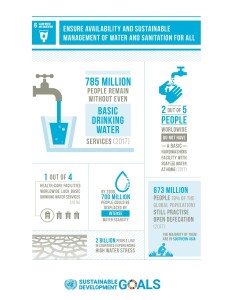From ‘Day Zero’ to ‘Spaceship Earth’ – Confronting Global Water Scarcity
Nov 16th, 2020 | By admin | Category: Water IssuesBy Suzanne York.
‘Day Zero’ – it’s a term so applicable to our times of environmental overreach.If you aren’t familiar with the term, it came into vogue a couple of years ago when Cape Town, South Africa, was facing a water crisis of fairly epic proportions. Day Zero was the city’s term for the day the municipal water supply ran dry and would be rationed to residents.
The city had endured a severe three-year-long drought, and despite having strong environmental policies and regulating its water usage, it didn’t diversify its water sources. Officials thought there would be plenty of time to do so. They thought wrong. At one point it was just 90 days away from turning off the water taps. Restrictions and water-saving efforts were put in place; residents were even restricted to a maximum of 50 liters a day for short time.
In 2018, Cape Town managed to avert its Day Zero, through major reductions in water usage, changes in behavior and the return of precious rains.
Cape Town’s experience was a cautionary tale for many cities around the world. The World Economic Forum has called water scarcity “one of the greatest challenges of our time.” Large cities such as Chennai and São Paulo have also faced dire water situations.
Watch this video – Is the World Running Out of Clean Water?
A recent study from researchers at Stanford University and the National Oceanic and Atmospheric Administration (NOAA) predict more Day Zeroes on the horizon, mainly driven by climate change. The researchers came to the conclusion that climate change made the Cape Town’s ‘Day Zero’ drought five to six times more likely.
The study said parts of the world with a similar climate to South Africa, like California – which has just gone through a horrific fire season – could face their own Day Zero droughts in the coming years. Other regions with a comparable climate to South Africa include southern Australia (with major fires in 2019/2020, southern Europe (Greece in particular) and parts of South America (with fires in the Amazon and Pantanal in 2020).
According to lead author Salvatore Pascale, a research scientist at Stanford’s School of Earth, Energy & Environmental Sciences, “In the worst-case scenario, events like the ‘Day Zero’ drought may become about 100 times more likely than they were in the early 20th-century world.”
The rather sad reality is that this is just another study amongst hundreds, maybe even thousands, warning us to take action to avert major climate crises. There is some brief media attention, and then it is time to move on to other problems. We have short attention spans and suffer from short-term thinking. Also, modern human beings are very good at denial, and maybe this is the predominant force. That, and procrastination.
Maybe it’s just too much to think about having to change behavior for the long-term. Or, that it is easier to keep the faith that technology will save us. Let’s build desalination plants, whatever the costs, and not endure any inconvenience by trying to conserve and consume less water. And it’s not just individuals. All types of businesses and industries use a lot of water, from computers to agriculture to fashion. A lot goes into meeting the needs of a world of 8 billion people and growing.
Lastly, what about non-human species? What are their rights to water, in a world where most people have not learned how to live within their planetary means? We take and exploit and degrade the environment to support our ways of living, without thinking of the consequences.
There’s a reason why this epoch is now referred to as the Anthropocene – loosely speaking, a period of time in which human activities have been a dominant force on the planet.
Perhaps COVID-19 has taught enough of us that we need to change our ways, that we are part of the web of life, and that we exploit nature to our own detriment. Time will tell, but time is precious and we need to take action now. Many experts think we have about a decade to prevent irreversible damage from climate change.
Modern people are fickle. Most of us all too easily slip back into old behaviors. Pascale, the Stanford scientist, said, “I’m sure that many Cape Town residents have forgotten what happened now that lakes and water reservoirs are back to normal.” Yet he stressed that “…this is the moment to rethink the old way of managing water for a future when there will be less water available.”
To change old ways of thinking and doing, we can strive to live our lives with Buckminster Fuller’s ‘Spaceship Earth’ analogy as a guide – “We are not going to be able to operate our Spaceship Earth successfully nor for much longer unless we see it as a whole spaceship and our fate as common. It has to be everybody or nobody.”
Suzanne York is Director of Transition Earth.

![[Photo: Tom Raftery, Flickr/Creative Commons]](http://populationgrowth.org/wp-content/uploads/2020/11/faucet-300x205.jpg)
